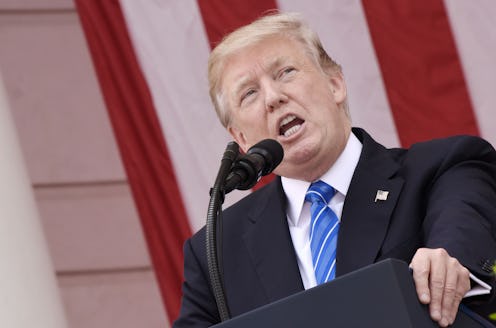
Recently, many have speculated about the possibility of impeaching Donald Trump, following the emergence of allegations that Trump asked former FBI director James Comey to end the agency's investigation of Michael Flynn (the administration denies these claims). In addition to impeachment speculation, many are also wondering whether Trump could be indicted on criminal charges as a sitting president. While, based on history, it is unlikely that Trump could be indicted while in office, the matter of presidential indictment and prosecution is certainly something that is up for debate.
Recently, allegations have emerged that Trump may have committed obstruction of justice, a federal crime, by allegedly asking Comey to end the FBI's investigation of former White House National Security Adviser Michael Flynn's alleged ties to Russia. The Department of Justice (DOJ) appointed former FBI director Robert Mueller as special counsel to oversee the investigation into the Trump campaign and its alleged links with Russia. In response to the announcement of Mueller's appointment, Trump expressed his support for Mueller but denied any wrongdoing, saying in a news conference:
I respect the move, but the entire thing has been a witch hunt, and there is no collusion between — certainly myself and my campaign, but I can only speak for myself and the Russians. Zero. ... Believe me, there's no collusion. Russia is fine, but whether it's Russia or anybody else, my total priority, believe me, is the United States of America.
Many are now wondering whether or not the DOJ could bring criminal charges against Trump if their investigation finds that he did indeed obstruct justice. According to The New York Times, most legal experts believe that levying charges against Trump while he is president is unlikely, as the prevailing legal view holds that a sitting president is immune from prosecution. However, if Trump were to leave office through resignation or removal, he could then be charged with a crime, as he would no longer be holding the office of president.
That being said, the Constitution does not dictate one way or the other whether a sitting president can be charged with a crime. According to The New York Times, the Constitution is very clear in stating that the president and other officials can be charged with a crime after they have left office. Article I, Section 3 notes that, if impeached and removed from office, a "convicted party" is "liable and subject to indictment, trial, judgment and punishment, according to law."
However, the Constitution does not explicitly indicate whether or not a sitting president can be charged with a crime. Most legal experts, as well as the Department of Justice's Office of Legal Counsel, argue that one can infer that the Constitution protects a president from prosecution while in office, as the threat of prosecution could interfere with the president's ability to do his or her job.
According to Vox, this sentiment is aptly captured in a 1997 law review article by Yale constitutional law professor Akhil Reed Amar and his former student Brian Kalt, now a law professor at Michigan State University. The article notes that the president is a "unique official" whose prosecution would profoundly impact the well-being of the country. Additionally, the authors indicated that because the president could fire any federal official who decided to prosecute him or her, a presidential indictment would be largely impractical.
However, because the Constitution is vague on the matter, not everyone agrees that a sitting U.S. president is immune from criminal prosecution. According to The New York Times, Eric M. Freedman, a law professor at Hofstra University and leading scholar on the matter, profoundly disagrees with the notion that a president cannot be charged with a crime. Freedman told the Times that since other federal officials have been indicated while in office, the same possibility should exist for a president. Moreover, Freedman noted that he believes presidential prosecution immunity is "inconsistent with the history, structure and underlying philosophy of our government, at odds with precedent and unjustified by practical considerations."
Freedman also revealed to Vox that he believes that a U.S. president can be prosecuted by state and local officials, since, unlike U.S. attorneys, they do not serve at the pleasure of the president. Freedman further noted that if this were to happen, the case would likely go to the Supreme Court, which would then decide the question of presidential indictment and prosecution once and for all.
However, while Freedman is certainly adamant in his stance, the fact remains that, while not specified by the Constitution, the majority of the U.S. legal community seemingly believes that a sitting president cannot be indicted. Thus, while impeachment and removal from office certainly remain a possibility for Trump if the DOJ's investigation finds that he did obstruct justice, facing criminal charges as a sitting president would be much more unlikely.